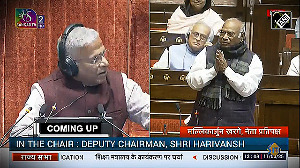The Reserve Bank of India on Saturday cut repo rate by 100 basis points to 6.5 per cent and reverse repo by 100 basis points to 5 per cent.
The primary liquidity made available to the system through these measures is worth over Rs 3,00,000 crore (Rs 3,000 billion), RBI Governor D Subbarao said in Mumbai.Here are the highlights of the RBI measures, according to a central bank statement:
- In view of the need to enhance credit delivery to the employment- intensive micro and small enterprises sector, it has been decided to provide refinance of an amount of Rs 7,000 crore (Rs 70 billion) to the Small Industries Development Bank of India under the provisions of Section 17(4H) of the Reserve Bank of India Act, 1934.
The utilisation of funds will be governed by the policy approved by the Board of the Sidbi.
- The RBI is working on a similar refinance facility for the National Housing Bank of an amount of Rs 4, 000 crore (Rs 40 billion). It will announce the details after consideration of the proposal by the Central Board of the Reserve Bank which is meeting next week.
- On November 15, 2008, the Reserve Bank had announced that proposals by Indian companies for premature buyback of foreign currency convertible bonds would be considered under the approval route, provided that the buyback is financed by the company's foreign currency resources held in India or abroad and/or out of fresh external commercial borrowings raised in conformity with the current norms for ECBs.
Extension of FCCBs was also permitted at the current all-in cost for the relevant maturity.
On a review, it has now been decided to permit Authorized Dealers Category - I banks to consider applications for premature buyback of FCCBs from their customers, where the source of funds for the buyback is: i) foreign currency resources held in India (including funds held in EEFC accounts) or abroad and/or ii) fresh ECB raised in conformity with the current ECB norms, provided there is a minimum discount of 15 per cent on the book value of the FCCB.
In addition, the Reserve Bank will consider applications for buyback of FCCBs out of rupee resources provided that: (i) there is a minimum discount of 25 per cent on the book value; (ii) the amount of the buyback is limited to US $ 50 million of the redemption value per company; and (iii) the resources for buyback are drawn out of internal accruals of the company as certified by the statutory auditor.
- It has been decided that loans granted by banks to Housing Finance Companies for on-lending to individuals for purchase/construction of dwelling units may be classified under priority sector, provided the housing loans granted by HFCs do not exceed Rs 20 lakhs (Rs 2 million) per dwelling unit per family.
However, the eligibility under this measure will be restricted to five per cent of the individual bank's total priority sector lending. This special dispensation will apply to loans granted by banks to HFCs up to March 31, 2010.
- Under the current guidelines, exposures to commercial real estate, capital market exposures and personal/ consumer loans are not eligible for the exceptional regulatory treatment of retaining the asset classification of the restructured standard accounts in standard category.
As the real estate sector is facing difficulties, it has been decided to extend exceptional/ concessional treatment to the commercial real estate exposures which are restructured up to June 30, 2009.
- In the face of the current economic downturn, there are likely to be more instances of even viable units facing temporary cash flow problems.
To address this problem, it has been decided, as a one time measure, that the second restructuring done by banks of exposures (other than exposures to commercial real estate, capital market exposures and personal/ consumer loans) up to June 30, 2009, will also be eligible for exceptional regulatory treatment.
- In view of the difficulties faced by exporters on account of the weakening of external demand, it was decided that the interest rate on Post-shipment Rupee Export Credit up to 180 days will not exceed BPLR minus 2.5 percentage points.






 © 2025
© 2025